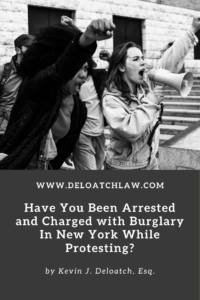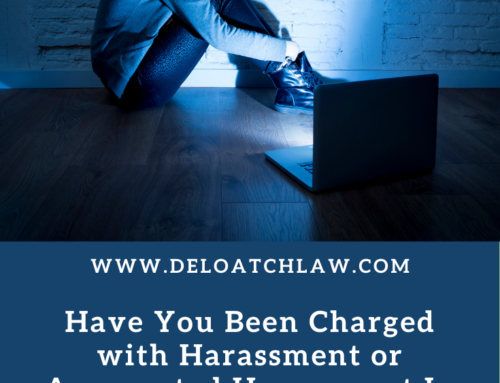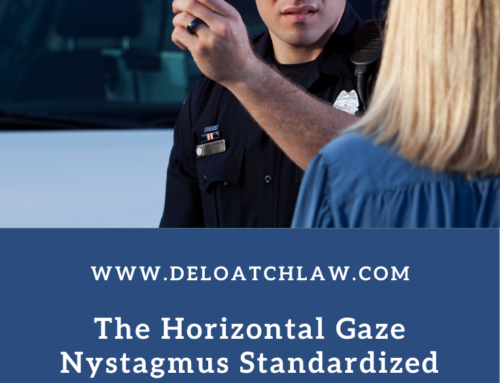Have you or someone you know recently been arrested and charged with burglary in New York while protesting? Despite what you may already think you know about the crime of burglary; it is more encompassing than the proverbial masked person(s) breaking into a house to steal a television. There are several not-so-obvious circumstances in which a person can be charged with the crime(s) of burglary in New York. For example, it’s not uncommon for someone to be arrested and charged with various crimes, including burglary, while protesting.
The current conflict in the Israel/Palestine region has spurred a wave of protests and demonstrations throughout the United States including New York. Unfortunately, those protests resulted in the arrests of many demonstrators, some of whom were charged with the crime(s) of burglary.
What exactly constitutes burglary in New York?
 Burglary Under New York Law
Burglary Under New York Law
If you have been arrested and charged with burglary in New York, what you need to know is that the crime of burglary falls under three sections of the New York Penal Code (PL):
- PL § 140.20 – burglary in the third degree;
- PL § 140.25 – burglary in the second degree; and
- PL § 140.30 – burglary in the first degree.
Although the three sections have considerable overlap, there are specific differences in the sections.
a. Third Degree Burglary
Burglary in the third degree under PL § 140.20 provides the broadest definition of burglary. “A person is guilty of burglary in the third degree when he knowingly enters or remains unlawfully in a building with intent to commit a crime therein.”
Thus, if a person is in any building (i.e., home, business, school…etc.) that they don’t have the right to be in, and with the intent to commit any crime (i.e., theft, assault, arson, criminal mischief…etc.), they can be charged with burglary.
Burglary in the third degree is a class D felony, punishable by up to 7 years of imprisonment years, as described in NY PL § 70.00.
b. Second Degree Burglary
Burglary in the second and third degrees under PL § 140.25 and PL § 140.30, respectively, provide for very specific circumstances that warrant increased penalties.
For example, a person can be charged with burglary in the second degree under PL § 140.25, if during either 1) the entry of, or remaining in any building; or 2) immediate flight therefrom, he/she or another participant:
- Is armed with explosives or a deadly weapon;
- Causes physical injury to another person who is not a participant
- Uses or threatens the immediate use of a dangerous instrument;
- Displays what appears to be a firearm.
Moreover, the person can be charged with second degree burglary if the building is specifically a dwelling (i.e., a place where a person lives).
Burglary in the second degree is a class C felony, punishable by up to 15 years of imprisonment, as described in NY PL § 70.00.
c. First Degree Burglary
Burglary in the first degree under PL § 140.30 is very similar to second-degree burglary with a few notable differences. Firstly, the building must be a dwelling. Secondly, if the person displays what appears to be a firearm, it is an affirmative defense that the firearm was “not a loaded weapon from which a shot, readily capable of producing death or serious physical injury, could be discharged”. Thus, the defendant has the burden of proving that the firearm wasn’t real, loaded, or capable of producing serious physical injury or death. If they can do so, then the most they can be convicted of is second degree burglary.
Burglary in the first degree is a class B felony, punishable by up to 25 years of imprisonment, as described in NY PL § 70.00.
What should You Do If You Are Arrested?
So, have you or someone you know been arrested and charged with burglary while protesting in New York? If yes, you are probably wondering what to do. First, you should always remember your rights. You should invoke your right to remain silent and your right to an attorney. Second, you should seek the advice of an experienced criminal defense attorney as soon as possible, preferably before the arraignment if possible. The results of all criminal prosecutions are determined by the facts and circumstances of the specific case and the skill and experience of your defense attorney.
If you or someone you know has been arrested in New York call the Law Office of Kevin J. Deloatch, Esq. at (646) 792-2156. The office has an extensive criminal law practice. The outcome of a criminal case is often determined by what occurs at the beginning stages of the prosecution. Call today for a free consultation.








